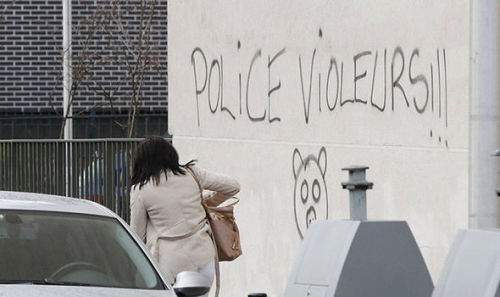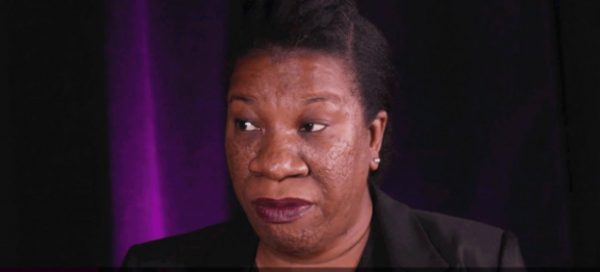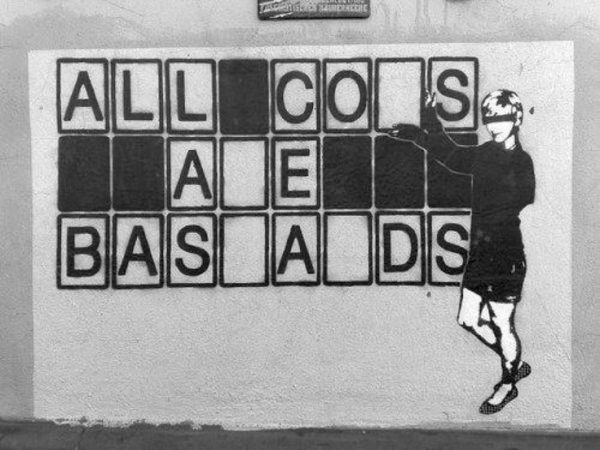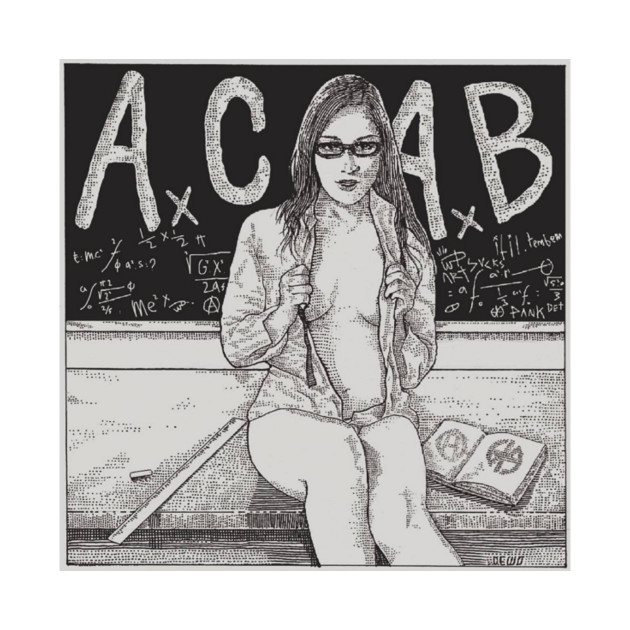 Content warning: This piece contains general discussion of sexual assault and state violence.
Content warning: This piece contains general discussion of sexual assault and state violence.
Last week, Time Magazine published a story about sex worker exclusion from the #metoo phenomenon. Sex workers are a criminalized population vulnerable to sexual assault, composed of people oppressed in many intersectional ways, so the inaccessibility of this newly popularized movement against rape and harassment is particularly egregious. At worst, it seems that only privileged women have access to an individualized #metoo movement. At best, sex workers are told they should have their own separate-but-equal movement in a manner which reinforces popular misconceptions about the sexual violence we face as intrinsic to sex work and our clients rather than stemming from stigma and the state.
In reality, much of the abuse and violence sex workers face comes from institutions like the police. This makes participating in a sex worker #metoo difficult since it entails calling abusers in positions of power to account.
Police are guilty of routinely targeting marginalized women and raping them. They prey on women whose allegations against police are rarely taken seriously. These women include sex workers (especially street and survival sex workers), women of color, trans women, and drug-using women—most often, women who are part of many or all the above groups. We are told to stand up for ourselves and report sexual assaults to the police, but when the abuser is the police, it becomes impossible to report it. A Brooklyn teenager tried to report a sexual assault committed by two police officers. Nine officers showed up en masse at the hospital she was in to convince her not to do a rape kit. Predatory police officers are commonly simply shuffled from one department to another when suspected of sex crimes.
In Alaska, the police are allowed to engage in sex acts before arresting a sex worker. This system of rape-as-entrapment results in only the provider being arrested. In Oakland, police officers had sex with an underage sex working teen in exchange for information about future busts. Only three of the men involved were convicted and the victim was sent away by the department to an out of state rehab facility in an attempt to shut her up. NYPD officer Raul Olmeda was paid to investigate sex trafficking. Instead, he paid an underage girl for sex and filmed their numerous encounters. It took seven months after police seized his computer for charges to be filed against him. A Phillipsburg police officer demanded free sex from two Backpage providers, threatening arrest. The officer, Justin Sanderson, had a history of sexual harassment at other law enforcement jobs and yet he was still able to gain employment in Phillipsburg. When sex workers get in trouble, we are not as immune to consequences as Sanderson was—when we are arrested, our records are tainted and we are not able to skip from job to job. This is one of many reasons why the threat of arrest has historically been very effective for rapist cops to wield against sex workers. Ex-Oklahoma City police officer Daniel Holtzclaw assaulted 13 Black women and young girls, many of them drug-using sex workers and almost all possessing records. It was only because the thirteenth Black woman he assaulted had a clean record and friends within the police department that the other twelve women’s reports became credible. It’s rare that officers are held accountable for being sexual predators the way Holtzclaw was. The majority of police departments do not have a training program for on-duty police officers to teach them to avoid sexual misconduct toward citizens, let alone ones training them to behave themselves appropriately specifically towards sex workers.
Confronting this police abuse is next to impossible for sex workers. Some of us have been arrested after police engaged in sexual activities with us. Some of us have been raped by cops who threatened us with arrest if we spoke out. Some of us have been assaulted and bullied by men posing as police officers. Police harassment can literally ruin our lives. Early last November, a migrant Brooklyn sex worker died jumping out of a window in order to avoid being re-arrested and deported during a brothel raid, after local cops carried out a campaign of terror to pressure her into becoming a confidential informant. The police are major perpetrators of violence against sex workers, whether as abusive individuals or as an oppressive system of state violence, and most of us are not in a position to speak out against them.
Judges also hold prejudices against sex workers. In Philadelphia, Judge Teresa Carr-Deni reduced a gang rape charge to “theft of services”, leaving the sex worker victim without justice. Several states make sex workers ineligible to receive rape victim compensation funds due to the criminalization of our work. In Indiana, for example, “a victim who was injured while committing, attempting to commit, participating in or attempting to participate in a criminal act” is ineligible for victims’ compensation.
When the entire apparatus of law enforcement and criminalization contributes to sexual violence against sex workers, it’s difficult to understand how an individualized, neoliberal movement like #metoo has become can help. Standing up against specific abusers, however powerful they are, cannot do much when an even more powerful system continues to create the conditions of our abuse. While the Time piece does devote a few paragraphs to police sexual abuse of sex workers—most notably, referencing the results of a 2016 Department of Justice report on the Baltimore police which found that the department ignored sexual assault reports made by sex workers and many officers raped sex workers after threatening incarceration—what it and other mainstream media reports on the topic miss is that criminalization and state violence are responsible for the particularly vicious rape culture we sex workers live with. When will it be #timesup for rapist cops—or for a criminal justice system which legitimizes that rape as an investigation technique and would rather jail us and reward our abusers?

Of course, there are many other problems with the #metoo discourse when it comes to sex workers and other marginalized people. Tarana Burke began the Me Too movement in 2006 in order to create a safe space for young girls of color. But in this decade, Me Too has shifted into a social media phenomenon lead mostly by wealthy white women. After Alyssa Milano tweeted #metoo, it became a trending hashtag on Twitter. Soon it carried over to other forms of social media. #metoo gave victims a chance to expose their abusers and share their experiences with sexual assault and harassment in our post-Harvey Weinstein era. But with rich white women being the most prominent voices in this movement now, where do marginalized people fit in?
As #metoo became repopularized, I watched Meryl Streep, Emma Thompson, and Gloria Steinem stand in solidarity with their famous rich peers. Each one has publicly voiced their distaste for Weinstein. Yet these same women abandoned sex workers by signing CATW’s (Coalition Against Trafficking in Women) letter asking Amnesty to vote no against decriminalizing sex work as an institutional policy. While we were advocating for a safer work environment which would better allow us to protect ourselves from sexual assault on the job, they swooped in with their savior complex to silence us. I realized that I don’t matter to these women. For Streep, Thompson, and Steinem, only rich, high-profile, white people matter. Seeing these women stand by their peers alienates sex workers from the #metoo movement.
Marginalized people face the difficult task of speaking out against abuse while simultaneously fighting discrimination. Sarah McBride, a trans woman who was raped, wrote, “I knew that when people hear ‘trans person’ and “sexual assault” in the same story, their minds pass over the reality of the situation and immediately go to the dangerous myth of the ‘trans bathroom predator’.”
Disabled people may have trouble joining the #metoo movement because they are routinely desexualized. Often, disabled survivors aren’t believed. Police, family, and caregivers might consider their account of events unreliable. Disabled people may even face abuse from a caregiver, making it almost impossible for them to come forward against the very person they are dependent on.
Tarana Burke, the founder of Me Too, wrote that her movement “was started for brown and black girls. They’re still being ignored.” Now, during #metoo’s recent resurgence, rich white women stand in solidarity with each other. Only one celebrity, the famously radical Jane Fonda, used her platform to discuss how sexual assault has been a problem for women of color. In an MSNBC interview, Fonda commented, “It’s too bad that it’s probably because so many of the women that were assaulted by Harvey Weinstein are famous and white and everybody knows them. This has been going on a long time to black women and other women of color and it doesn’t get out quite the same.”

Sex workers of color, disabled sex workers, trans sex workers, and sex workers who belong to many or all of these groups thus remain neglected even as #metoo frees their civilian white counterparts to speak out against their abusers.
It was also frustrating to watch people feel empathetic toward victims while suggesting their predatory abusers see sex workers. I saw this sentiment expressed when the Louis CK story broke and when Reddit shut down the highly misogynistic board r/incel. Sex workers are not a resource for predators. CK got off on the shock factor of exposing himself to his victims and humiliating them. He did not want a consensual exchange, and sex work operates on a consensual exchange. As Alana Massey put it in Self, “The idea that Louis CK or any other man who has been accused of predatory behavior would spontaneously develop a healthy respect for boundaries in the context of hiring a sex worker is magical thinking in a world where sex workers remain dangerously stigmatized and frequent targets for violence.”
When Reddit shut down r/incel due to violent content, many people wondered why incels don’t just hire sex workers. Incels are a group of misogynists who believe they are “involuntarily celibate” because women deny them the sex they feel entitled to. They advocate for rape and violence against women. There is even a subculture of incels called escortcel who brag about abusing sex workers to each other online. I don’t understand why people continue to think it’s our job to deal with these abusive men. I’ve even seen posts which opine, “I don’t wish incels on anyone, but why don’t they just hire a sex worker.” This commenter wouldn’t wish an incel on anyone—but then, I suppose a sex worker doesn’t count as anyone.
It’s especially insulting that during this recent outpouring of sympathy towards abuse victims, the very people expressing that compassion think misogynistic abusers should seek us out. Why are sex workers expected to be an outlet for abusers? Sex workers are not a safety valve for dangerous men. This Victorian-era conception of us as shielding “respectable” women from violent male lust and vice should finally be recognized as outdated and inhumane.
Some activists have proposed a separate #metoo for sex workers. A women’s group approached my fellow provider regarding such a sex worker event, asking if she would like to share “bad date” stories. My friend and I discussed our discomfort with this idea—sharing so-called “bad date” stories with non-sex workers feels like feeding their hunger for trauma porn. We are already bombarded on all sides by the idea that sex work equates with victimhood. We need our own safe spaces to discuss things civvies don’t understand—and by that, I do not mean holding sex workers’ auxiliary #metoo events alongside them. We discovered later that this women’s group had no sex workers involved with organizing this event and that it had been planned at the last minute. Our movements need to be led by us. We deserve better than to be an edgy afterthought for civilian organizers.

A sex workers’ #metoo could also force us to out ourselves. How will sex workers participate in a separate #metoo movement, given how internet-dependent the phenomenon has become? We can’t tweet from our personal accounts. Will we tweet from our escort, dancer, or porn accounts? This could have consequences—even civilians face slut-shaming and victim-blaming after sexual assault. Sex workers who come forward may face double the backlash that non-sex workers do as this victim-blaming and slut-shaming is paired with whorephobia. Sex workers sell an untarnished image to clients, and yet, survivors of assault are perceived by the public as tainted and at fault, even though they did nothing wrong. Sex work is a business that relies heavily on discretion, and coming forward about work-related assault can lead rape-culture-denying clients—who after all are just as misogynistic as most groups of men—to believe that sex workers are spreading rumors to be vengeful.
Another problem with a civilian-conceived sex worker #metoo movement centered around “bad date” stories is that it once again overlooks the fact that we are capable of having personal lives. Sex workers often face violence and abuse in our relationships. And our domestic abusers often use the stigma of our work against us. Consider Rob Kardashian posting revenge porn of Blac Chyna and the brutal beating of adult film star Christy Mack by her boyfriend War Machine. Both abusers justified their behavior by pointing to the supposed promiscuity of their sex worker victims.
It is ignorant to believe that sex workers are too dirty and undateable to maintain personal relationships. Yet most proposed #metoo movements for sex workers are focused on the idea that the violence we face is always client-based.
And a sex worker #metoo may not even benefit the part of the community that needs it the most. Sex workers are not a monolith—we are a diverse group. As in every field, some of us work in better environments than others. Many of us are lucky enough to have safe spaces and peer networks to reach out to. But if there were a separate #metoo for sex workers, the most disadvantaged sex workers probably would not be able to participate. Sex workers who engage in survival sex work and live in poverty may not have access to social media like the communities in which #metoo finds its home. Yet, these sex workers are the ones most vulnerable to violence and they should not be excluded.
For a separate #metoo for sex workers to be viable at all, it needs to be led by us. Misinformed would-be saviors should not advocate for us. CNN commentator S. E. Cupp made this clear with her NY Daily News article, “We need a #metoo movement but for prostitutes: The only way to combat their routine victimization is to decriminalize sex work.” The title alone is extremely damaging and paints us as victims by virtue of our profession. And as any experienced ally knows, the term “prostitute” is a slur, with centuries of violent medical and legal history behind it. Many of us don’t even reclaim that word. You can’t advocate for a marginalized group while using a derogatory term to refer to them.

It’s obvious Cupp got no sex worker input for her article. She uses the terms “decriminalization” and “legalization” interchangeably. She claims she supports us, but her disdain for us is blatant. She avers, “I hate everything about prostitution: how it exploits women, how it cheapens sex, and how often it can lead to violence. And it’s for all those reasons that I think it should now be legal.”
Cupp looks down on sex work. How can someone advocate for a #metoo for us while thinking our very existence cheapens sex? Her statement reinforces the tired ideas that our job is dirty and that buying sex is wrong. And a person who views sex workers as constantly exploited is a person with a rescuer mentality who should not be speaking for us.
A #metoo for sex workers might seem like a good idea, but in praxis, there are too many prejudices which prevent us from talking about our lives in front of non-sex workers. Many of us already have our own peer support networks. In these networks, we can talk and not have to censor ourselves or worry about intolerance from non-sex workers. These spaces serve as our #metoo, but they’re not visible to the public. We don’t need to perform “brave survivor” for people who will not redress our wrongs the way they did those of Weinstein’s victims, in a movement which excludes so many of our intersectional identities. Marginalized groups need to have these spaces of their own, free from outside judgment. Tarana Burke knew that when she started the original Me Too for young girls of color: “They needed to find spaces where they could focus on their healing without having to be performative or guarded and ‘me too’ gave them that space.”
Furthermore, #metoo isn’t a good fit for sex workers because civilians don’t face the same rape culture landscape we do, in which state sexual violence can be used against our criminalized bodies with impunity. In a sense, then, our movement’s global struggle for decriminalization must serve as our #metoo until non-sexworkers are finally willing to tell their abusive police forces, unjust laws, and biased court systems #timesup.

I am so happy to see that paragraph about disabled workers in here!! I love reading your writing Lizzy and I hope this leads to other opportunities for your writing!
This article hits it bang on and I’m glad to see other workers writing articles about our issues! It’s about time civs stopped trying to speak for us and instead gave us a chance to speak for ourselves!
Something deeper going on? Something’s off? Quit beating around the bush. Just call everyone here misogynistic privileged white oppressive males like I know you want to. And nowhere near as bad as 95% of other stuff right now? Well who cares. It’s still terrible. Slightly less terrible, but terrible nonetheless. Trigger wouldn’t be writing about her if she wasn’t somehow being passed off as country without any sound reasoning whatsoever. Like 6+
I don’t know if you’ll see this comment, as your article was posted 6 months ago. On the off chance that you do, I have a question, which, of course, I have no expectation that you’ll answer.
What changes would you like to see in how police officers are disciplined or what violations warrant discipline? For example, would it help to make a blanket rule that it is a serious disciplinary infraction for an officer to have sex with a sex worker? Then, it is not a defense to say that it was consensual or whatever (this question goes beyond the insanity of the states that permit “consent” as a defense in cases of sex with a detained person). The power imbalance is too great. What rules that police could be disciplined for breaking would help to protect sex workers?